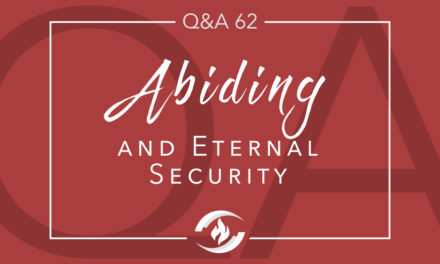Q.
John, I frequently hear people quoting James 2 that faith without works is dead, and then basically proceed to judge others who don’t live up to their personal standard of holiness and pronounce them unsaved. My question is, does this verse and overall passage in James even refer to salvation from
hell or is James speaking of being saved from something else?
James 2:14 KJV – What doth it profit, my brethren, though a man say he hath faith, and have not works? can faith save him?
Jordan
A.
Hello Jordan,
Great question on a debated passage! The controversy surrounds James 2:14-26, and the opening verse you mention is key to answering your question.
What is the topic of discussion (salvation or otherwise)? Who is the author addressing? The answers to these questions explicitly inform us as to the contextual usage of the word save, and both questions are answered in verse fourteen.
The word profit means “use” or “advantage,” and the question “What doth it profit” introduces the discussion. “What use it?” “What good or advantage is there?” The example given in the next several verses shows the uselessness of saying the right words without demonstrating them through corresponding action. If someone is destitute, in need of food and clothing, and all one does is speak words without acting to meet those obvious, tangible needs, then what good is it? The point of the illustration is usefulness.
Thus, considering the explicit example, the issue of chapter 2 is service, not salvation. Salvation is never based on good works. But, as believers serving others, faith that does not trust to obey is dead, being alone. Beyond this clear contextual help, the audience is named as brethren—believers. Because the passage is addressed to those who have been saved previously, the present discussion must be focused on something other than salvation.
Therefore, in this context, the word save is used in a sense other than salvation. In fact, this same word conveys the sense of healing in James 5 (“The prayer of faith shall save the sick”). The sense of James 2 is that the kind of faith that doesn’t trust to obey in serving others does not “save” or bring the needed help. It doesn’t help those in need, and it doesn’t help the ministry of the one who sees and only speaks.
As the passage continues, Abraham’s sacrifice of his son, Isaac, is cited as demonstrating faith. It certainly did demonstrate genuine faith—but not faith for his initial “salvation.” The first mention in Genesis that Abraham believed God and it was credited to him as righteousness was made at least forty years before he offered Isaac, and inclusion of this story in James 2 serves to illustrate the continuing faith of a believer, not the initial faith for salvation. Verse 24 clarifies that “ye (as mere men) see then how that by works a man is justified, and not by faith only,” whereas, from God’s divine perspective, faith can be seen even without the benefit of works.
The final citation concerning Rahab illustrates the same point. Hebrews 11 informs us, “By faith Rahab….” Therefore the justification by works referenced in James 2 is Rahab’s justification before men. Prior to this, God saw the justification by faith.
Salvation has never been by works. If James 2 is a salvation passage, then you must tip your hat to Catholic doctrine. Again, the opening of this portion of Scripture makes it clear that James 2 is a chapter covering sanctification/service and not salvation.
John
We’d love to hear your thoughts on this subject in the comments section below! If you have a question on another subject, we welcome you to make a submission by clicking here:










